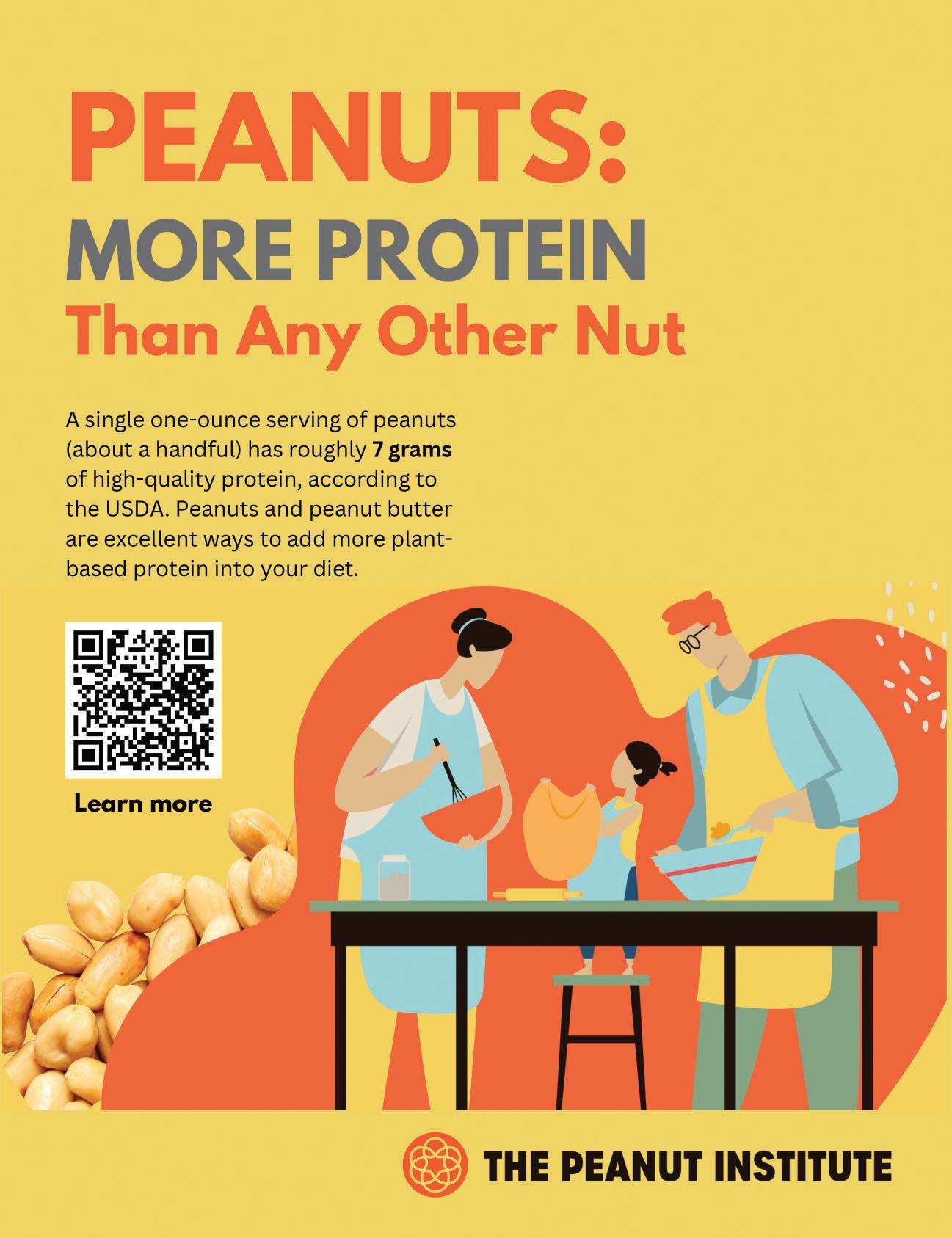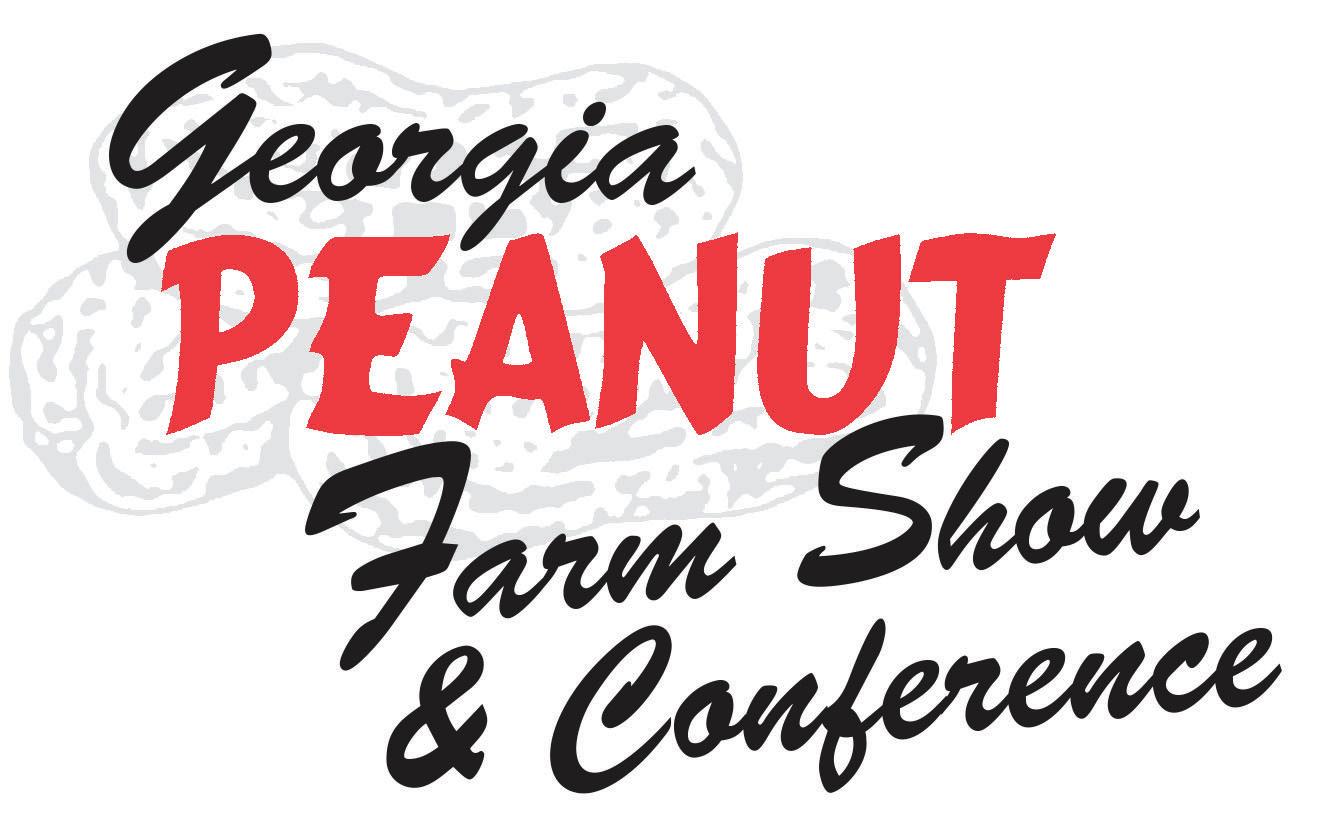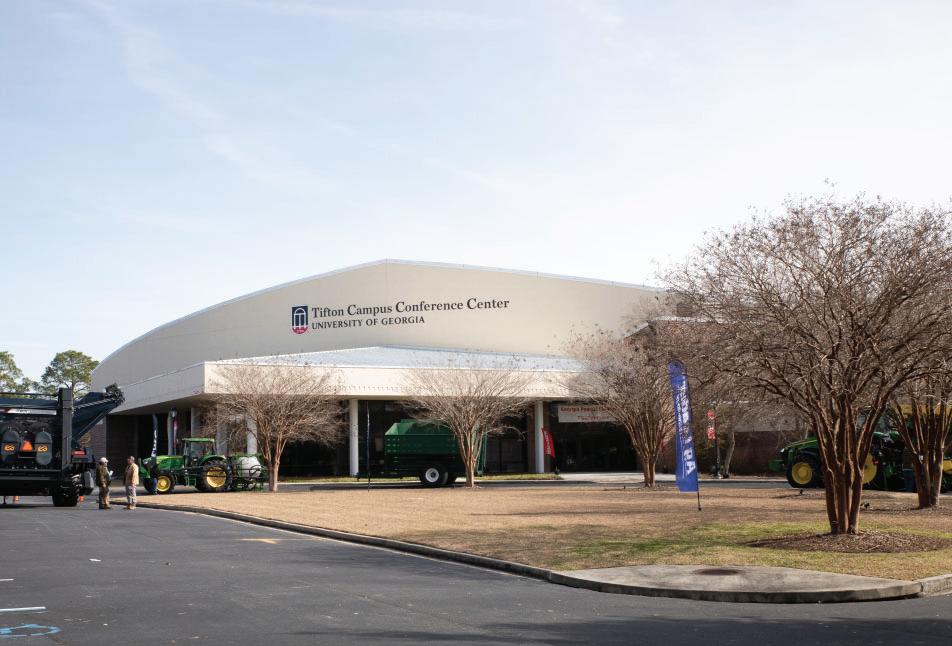

Billy Senkbeil's faith-fueled farm life




Billy Senkbeil's faith-fueled farm life

6 |
Billy Senkbeil has been farming since 1961 in Worth County, Georgia. Learn more about his passion for farming, promoting peanuts and his collection of toy pedal tractors.
10 |
The H.R. 1, The One Big Beautiful Bill Act passed Congress and was signed by President Trump in July. Learn more about the specific peanut provisions included in the legislation.
Twenty-seven peanut farmers and sheller representatives graduated from the Peanut Leadership Academy.
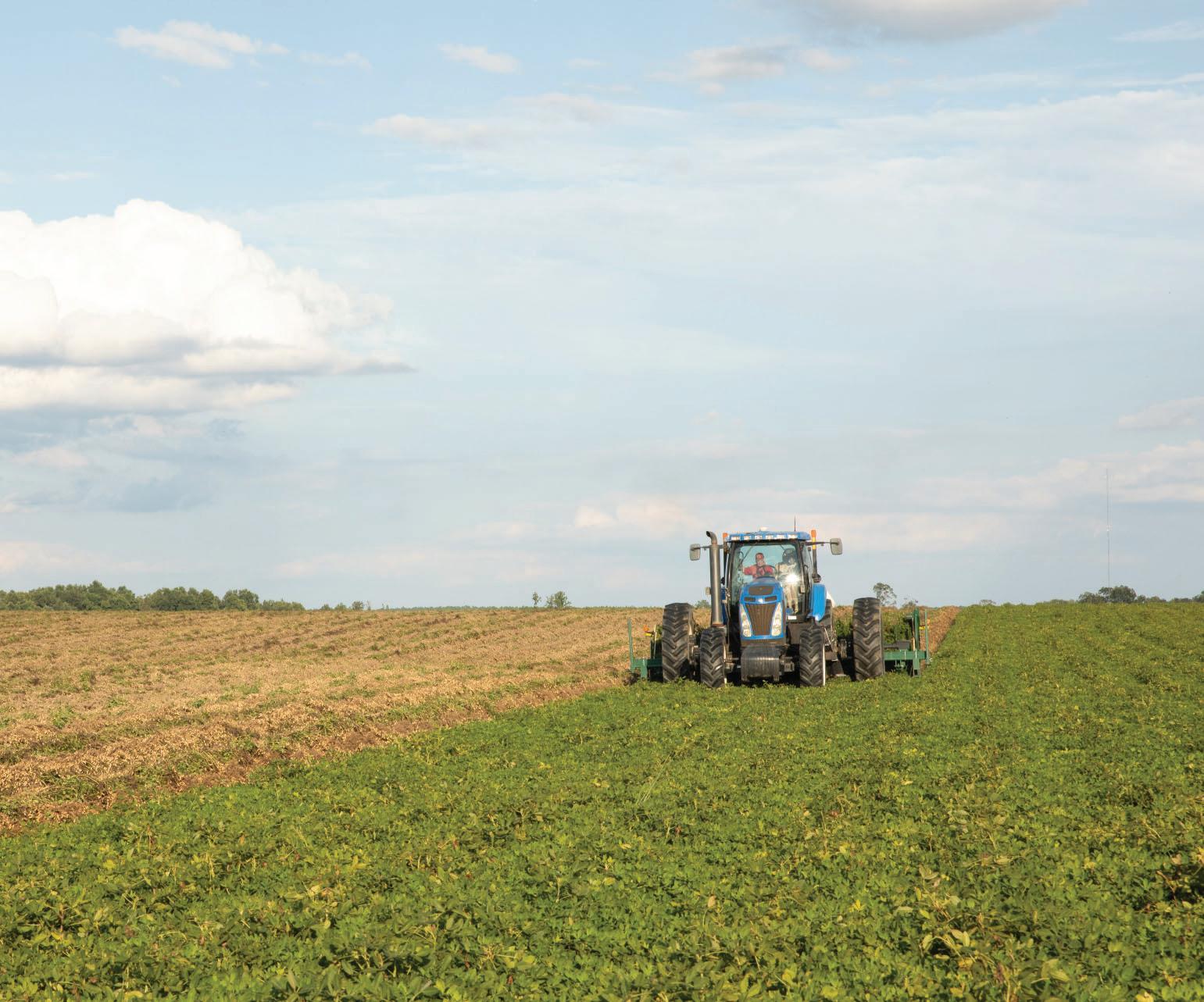

Billy Senkbeil's faith-fueled farm life since 1961 includes changes in farming, a world record peanut, peanut promotions and his treasured toy pedal tractor collection.

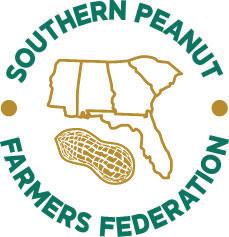
There's something about growing up on a South Georgia farm that teaches you what really matters — hard work, faith and family. My Daddy, Ronald Carter, lived every bit of that truth. When he passed away on Aug. 28, 2025, at the age of 89, we didn't just lose a father and grandfather — we lost one of those steady hands that built and shaped our rural communities.
Daddy was born in Valdosta in 1936, and he spent his whole life in and around Lowndes County. Farming was always part of who he was. He also worked for more than 35 years in the propane gas business, but even after long days on the job, he'd come home and tend to his fields and livestock. He raised corn, soybeans, tobacco and cattle. Farming wasn't just a livelihood; it was a way of teaching us responsibility, patience and pride in honest work.
One of the highlights of his later years came in 2024, when our family farm received the Centennial Family Farm Award during the Georgia National Fair. Agriculture was woven into every part of Daddy's life. He was a charter member of the Lowndes County Young Farmers and served as treasurer, always willing to lend a hand at fundraisers or pitch in for community events. He went on to serve as state chaplain for the Georgia Young Farmers Association in 2008 and was a lifetime member of the Lowndes County FFA Alumni, where he received the Honorary FFA Degree in 1993.
Daddy was a man of quiet faith and steady service. At Lake Park Church of Christ, where he was a charter member, he served as elder, song leader and Bible class teacher. He even traveled to Honduras on a mission trip, which was a big adventure for a man who loved home but loved serving others even more. That spirit of giving back carried over into his community leadership too. After a barn fire in 1960, he joined the Twin Lakes Volunteer Fire Department and served for 40 years, including chief. Later in life, he answered another call to serve, this time in city government — as council member, Mayor Pro Tem and Mayor of Lake Park — before retiring in 2022 after 18 years of public service.
But if you really want to know who my Daddy was, you had to sit down with him over a game of Checkers or Spoons. For me, his legacy isn't just in the acres he farmed or the titles he held. It's in the lessons he planted in us — that faith and family come first, that hard work pays off and that serving others is the best way to make a life matter.
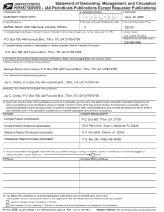
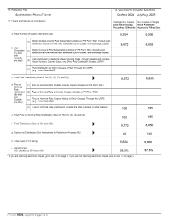

Joy Carter Crosby SEPF Editor

National Peanut Festival
Oct. 31 - Nov. 9, 2025, Dothan, Ala. For more info visit the website at nationalpeanutfestival.com.
Alabama Farmers Federation Annual Meeting
Dec. 7-9, 2025, Montgomery, Alabama. For more information visit alfafarmers.org.
Georgia Farm Bureau Annual Meeting
Dec. 7-9, 2025, Jekyll Island, Ga. For more information visit gfb.org.
American Peanut Council's Insights Summit
Dec. 10-11, 2025, The Fairmont, Washington, D.C. For more info visit peanutsusa.com.
American Farm Bureau Convention
Jan. 9-14, 2026, Anaheim, California. For more information visit fb.org.
Georgia Peanut Farm Show
Jan. 15, 2026, UGA Tifton Campus Conference Center, Tifton, Ga. For more information call 229-386-3470 or visit gapeanuts.com.
Georgia Young Farmers Association Annual Convention
Jan. 23-24, 2026, Jekyll Island, Ga. For more information visit gyfa.org.
Alabama Florida Peanut Trade Show
Jan. 29, 2026, National Peanut Festival Fairgrounds, Dothan, Ala. For more information call 334-792-6482 or visit alpeanuts.com or flpeanuts.com.
Mississippi Peanut Growers Association Annual Meeting
Feb. 11, 2026, Lake Terrace Convention Center, Hattiesburg, Miss. For more information visit misspeanuts.com.
National Peanut Buying Points Association Winter Conference
Feb. 12-15, 2026, The Galt House, Louisville, Ky. For more information visit peanutbuyingpoints.org.
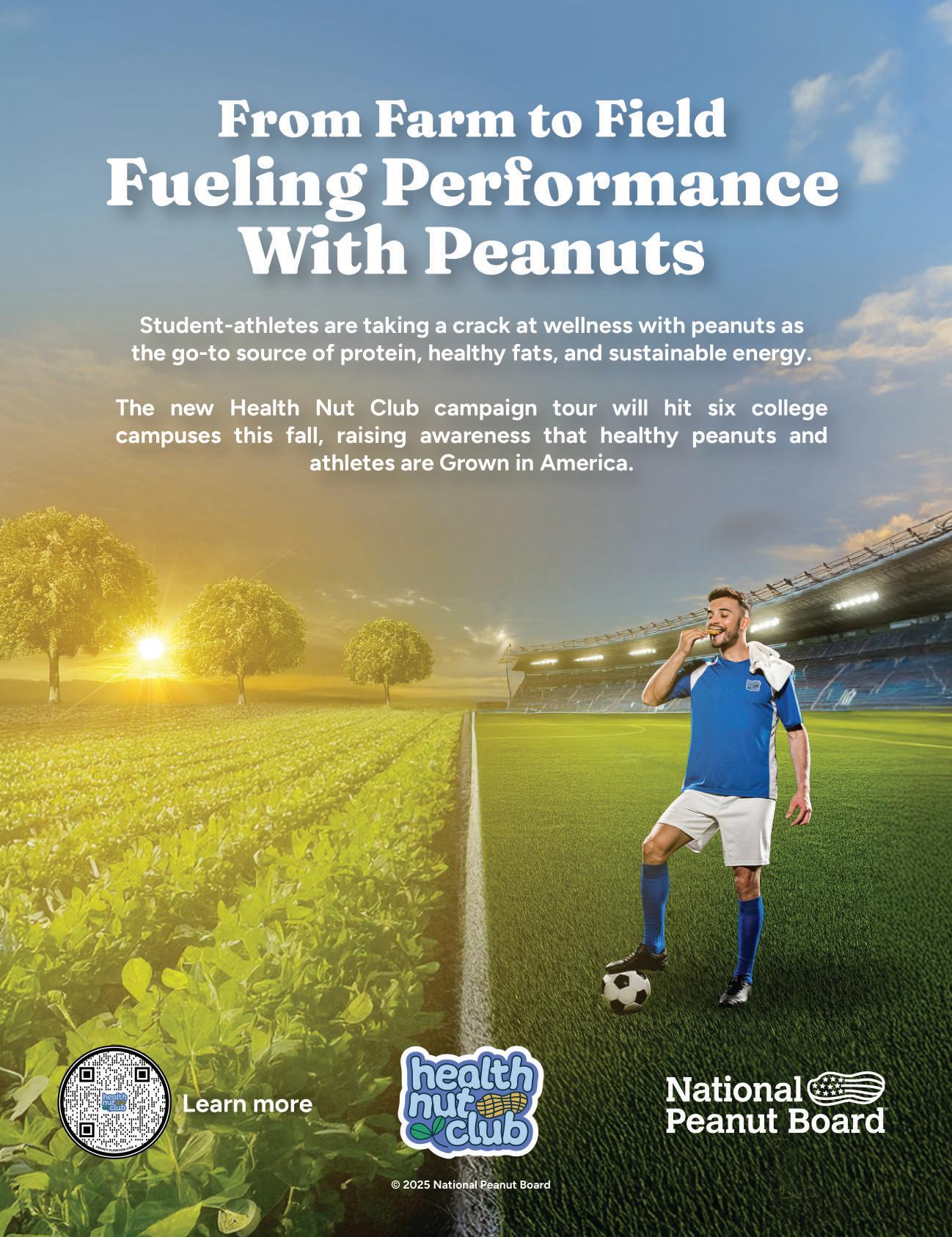
by Joy Crosby
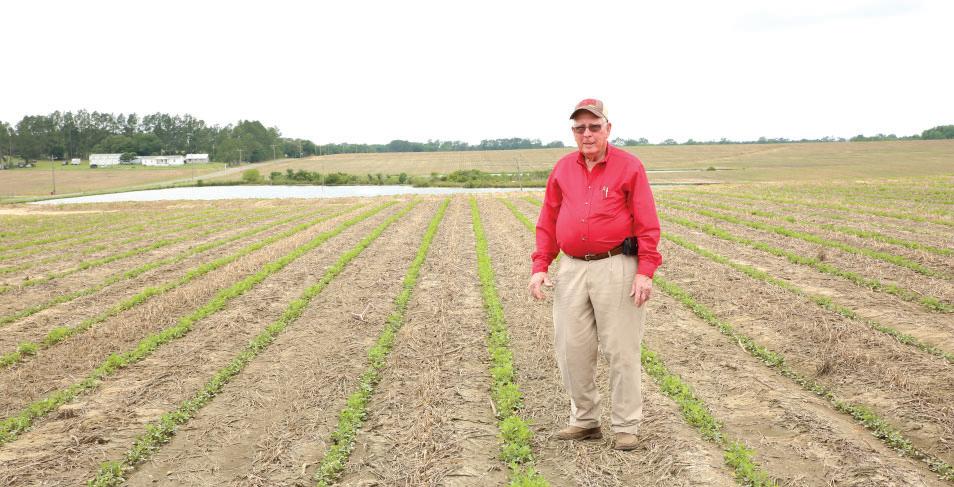
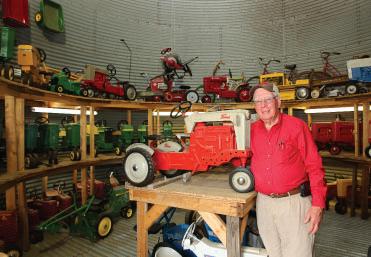
For more than six decades, Worth County farmer Billy Senkbeil has been rooted in the Georgia soil, growing peanuts, flying his plane over fields and preserving the legacy of Southern agriculture.
"I started farming back in 1961," Senkbeil says. "My granddaddy was a farmer, my daddy was a farmer, and I always knew I wanted to be one too."
Over the years, Senkbeil has seen the landscape of agriculture change dramatically.
"Farming today is a lot different than when my granddaddy and daddy farmed," he explains. "About 20 years ago, I started strip tilling and planting cover crops to help save our soil. It's not for everybody. It's kind of a niche
way of farming, but it's really changed how I farm. It made things easier and helped me take better care of the land."
Senkbeil doesn't irrigate his crops by choice. "I'm a dryland farmer," he says with a smile. "I've always said prayer is better than pivots. That's been my motto for years."
Weather, of course, remains one of the greatest challenges. "It can be too wet, too dry, too hot, or too cold," he says. "But you learn to roll with it."
His primary crop is runner peanuts, though he's also grown Virginia type peanuts, along with cotton and oats.
"Peanuts are a beautiful plant to watch grow," Senkbeil says. "I love them boiled, fried, roasted—you name it. I've even got a bag in my pocket right now."
When he's not tending to crops, Senkbeil can be found indulging in two of his favorite hobbies: collecting vintage pedal tractors and flying his airplane.
In his "toy barn," Senkbeil has a collection of more than 100 pedal tractors dating back to the 1940s and '50s. "It started when I bought one at a little auction," he recalls. "It was painted green, and I thought I finally
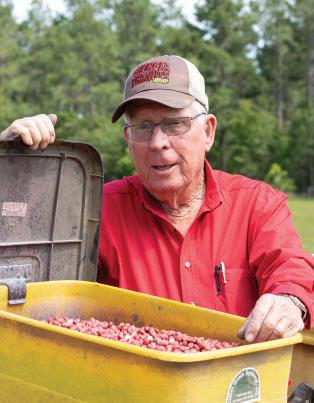
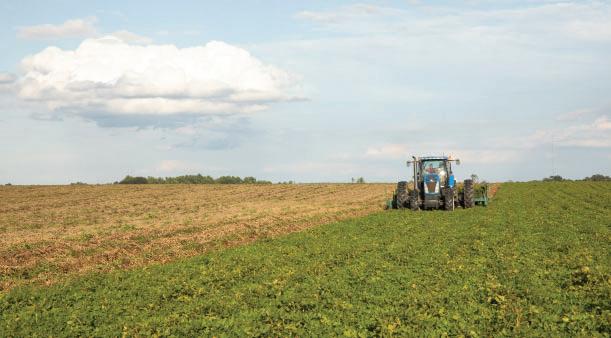
"That was a fun time," he says. "I got to do radio and TV spots all over the United States. All because of peanuts."
had me a John Deere, but it turned out it was a blue Ford under all that paint. That made me even happier."
His collection now includes rare pieces from John Deere, Farmall, AllisChalmers, Oliver and others—some so unique they belong in a museum. "I'd love for one person to buy the whole collection someday," he says. "It deserves a good home."
And when the fields are quiet, Senkbeil takes to the skies. "Flying is another hobby of mine," he says. "I like to get up in the afternoon, look at my crops, and see how other farmers' fields are doing. You can tell a lot from the air—weed control, vine growth, all of it."
Farming has opened doors Senkbeil never expected. "Back in the late '80s, I grew a Virginia peanut that turned out to be a world record," he recalls. "It made the Guinness Book of World Records."
That accomplishment caught the attention of Miracle-Gro, who featured him in a national advertising campaign. Later, Continental Airlines hired him as a spokesperson for their "Peanut Fares" campaign.
One of the commercials aired during the Super Bowl and the National Basketball Championship Games in the 1990s.
Senkbeil continues to look for every opportunity to promote Georgia Peanuts. He has hosted multiple tour groups on his farm, passed out peanuts at state and national Electric Membership Corporation meetings. One day, he heard about a couple walking across America who were close to his farm in Sylvester, Georgia, so Senkbeil found the couple and gave them Georgia Peanuts.
"I'm a dryland farmer. I've always said prayer is better than pivots. It can be too wet, too dry, too hot or too cold. But you learn to roll with it."
Billy Senkbeil
After 64 years, Senkbeil still loves what he does, but he's honest about the challenges. "We'd like to see peanut prices go up," he says. "Everything else has gone sky high. Farmers have to pay retail for what we buy and sell at wholesale—or less. We
need better prices to make it."
Despite those struggles, retirement isn't on his radar. "I don't want that word in my vocabulary," he laughs. "I still love farming. Something's kept me here all these years."
For young people dreaming of a life in agriculture, Senkbeil's advice is heartfelt and practical. "It helps if you grow up on a farm or inherit one," he says. "It's tough to start from scratch unless you've got good financing or maybe some government help. But if you've got the passion for it, stick with it. You'll find your way."
At the heart of it all, Senkbeil's story is about more than peanuts. It's about perseverance, pride and faith in the land.
"Farming gives you a kind of freedom," he says. "You're your own boss, but you've got to know when to plant, when to spray, when to harvest. You've got to know when to hold 'em and when to fold 'em."
And for Senkbeil, there's no better reward than watching a healthy stand of Georgia peanuts stretch toward the sun.
"I love peanuts," he says simply. "They've opened doors for me, and they've been good to me. And I'll keep growing them as long as I can."
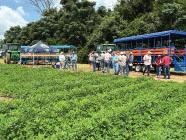
The University of Florida Institute of Food and Agricultural Sciences (UF/IFAS) hosted two key events for peanut producers in the Panhandle this August. The North Florida Peanut Field Day took place on Aug. 14 in Marianna, followed by the Extension Farm Field Day on Aug. 21 in Jay.
Both field days offered valuable updates on a range of critical topics, including new peanut varieties, insect pest management, nutrient recommendations, and effective strategies for disease and weed control. Attendees also had the opportunity to participate in educational field tours, providing a firsthand look at ongoing research trials.
The Florida Peanut Producers Association proudly sponsored both events, generously providing attendees with FPPA hats, roasted peanuts, and a peanut board for pod blasting.
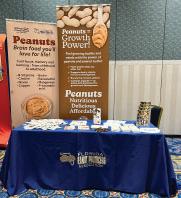
The Florida Peanut Producers recently participated in The Future of Pediatric Practice, the annual conference of the Florida Chapter of the American Academy of Pediatrics. This event brings together pediatric healthcare professionals from Florida and across the country. The conference featured presentations led by experts, interactive workshops, wellness activities, a medical student research forum, and a competitive resident forum, along with ample networking opportunities.
The Florida Peanut Producers Association exhibited at the event, distributing roasted peanuts and providing information on the benefits of introducing peanuts to babies early. The goal was to raise awareness about reducing peanut allergies and to address common myths surrounding this topic. Attendees who stopped by the FPPA booth were excited about peanuts and the research that has been done. Many pediatricians took the information and handouts back to their offices to share with new mothers.

The Alabama Peanut Producers Association attended the University of South Alabama versus Tulane football game on September 6 in Mobile, Alabama. Led by growers, Darrin and Amanda Driskell, APPA shared peanuts and information about peanuts grown throughout Alabama. Little Peanut was part of the display, allowing APPA to share info on early introduction to young parents. The activation included a video board and PSA during the game. The University of South Alabama also shared a signed football with the growers, and the Driskell and Miller farm families were recognized on the field as local producers in Mobile County.
APPA sponsors the "Peanut Runners" and shares peanut stories

The Alabama Peanut Producers Association sponsored the adult Jersey giveaway for the Peanut Runners event Aug. 28, 2025. For one weekend, The Montgomery Biscuits transformed into the Peanut Runners to honor Dr. George Washington Carver. The team partnered with Tuskegee University and the Tuskegee community on a new team identity and educational platform to pay homage to the innovative work that George Washington Carver performed with peanuts, as well as the "runner" variety of peanut grown in Alabama. Andrew Gamble, Henry county peanut grower, and members of his family helped to share the peanut story with game attendees. Also, highlighting peanuts was the Pike Road High School FCCLA team.
The Georgia Peanut Commission partnered with the social media account, The Feast Kings, to celebrate National Peanut Day on Sept. 13. The Feast Kings share delicious food ideas with their more than 1 million social media followers. For this partnership, a chunky peanut butter banana dip was developed featuring skinless Georgia peanuts and Georgia Grinders peanut butter. Easy to make, this sweet snack is perfect for sharing with friends and family during football season. The recipe was a favorite online garnering more than 160,000 impressions and 750+ shares.



During the 2025 Georgia Peanut Tour, attendees were able to learn more about peanut maturity from county Extension agents.

The Georgia Peanut Commission, University of Georgia and the National Peanut Research Lab hosted the thirty-seventh annual Georgia Peanut Tour, Sept. 16-18, 2025, in Valdosta, Georgia. Tour attendees began day one with a Hot Topics session highlighting an update on the 2025 peanut crop and a special focus on supply chain, market dynamics and international challenges facing the peanut industry today and new opportunities. On the next two days of the tour, stops were made at farms in Lowndes, Cook and Coffee counties where participants were able to see peanut digging and picking up close. Tours also included a variety of businesses within the peanut industry including Colombo North America, BCT Gin, Douglas Peanut & Grain, MANA Nutrition and Tifton Quality Peanuts. The 2025 tour included 129 industry representatives from 13 states. To learn more about the 2025 tour stops, visit the tour blog online at georgiapeanuttour. com.
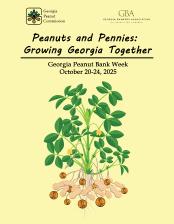
The Georgia Peanut Commission and Georgia Bankers Association join forces Oct. 20-24, 2025, to promote the 49th annual Georgia Peanut Bank Week. More than 177 financial institutions and local banks across the state offered a tribute to Georgia's 4,000+ peanut farm families and the sustainability they provide to Georgia's state and local economies.
The 2025 theme, "Peanuts and Pennies: Growing Georgia Together" showcases the affordable and nutritious peanut.
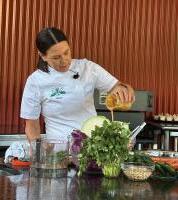
Chef Megan McCarthy presents a cooking demonstration of Spicy Peanut Slaw in the Edible Garden Outdoor Kitchen during the Georgia Peanut Day at the Atlanta Botanical Garden.
September 13 was National Peanut Day – the perfect day for the Atlanta Botanical Garden to celebrate Georgia Peanut Day! A tasting table featured Georgia Peanuts, a peanut butter cold brew coffee, peanut butter cookies, Georgia Grinders peanut butter with apple slices, YOM Peanut Butter Chocolate Chip ice cream and more.
The Edible Garden Outdoor Kitchen featured chef demonstrations during the day. Chef Megan McCarthy did two demonstrations featuring her Spicy Peanut Slaw and Chef Rusty Rowers did a demonstration featuring Grilled Chicken with Peanut Sauce. Audience members were able to ask questions, receive the recipes, and taste the finished dish.

K-12 School Nutrition celebrates Georgia Peanut Day
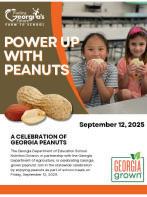
Schools across Georgia recognized September 12 as Georgia Peanut Day for K-12 School Nutrition. School districts across the state celebrated the day with peanut butter and peanuts –including 23,000+ of the new 1 oz. bags of Georgia Peanuts. The following week, GPC staff attended the Back to School Expo hosted by the Georgia School Nutrition Association, where more directors inquired about 1 oz. purchasing and celebrated the success of Georgia Peanut Day in their districts the previous week. In October, GPC will sponsor a chef demonstration for school nutrition managers, as well as attend a directors meeting in partnership with the Georgia Department of Education.
Joy Crosby, editor of the Southeastern Peanut Farmer, was elected president of the Ag Communicators Network during the organization's annual meeting in July. She succeeds Pam Caraway, executive editor of Farm Futures

the past president's plaque to Pam Caraway during the Ag Communicators Network annual meeting in Arkansas.
As president, Crosby will lead the national organization of agricultural communicators, which includes editors, writers, photojournalists, designers and public relations professionals from across the United States.
by Lorene Parker
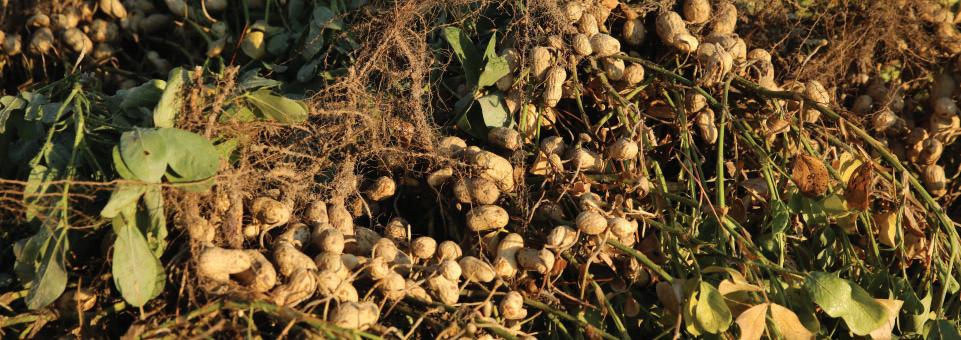
On July 4, 2025, H.R. 1, the One Big Beautiful Bill Act (OBBBA), was signed into law following votes of approval by the U.S. Senate and U.S. House of Representatives. The primary purpose of a budget reconciliation bill is to fast-track legislation required for federal spending, revenue and the debt limit.
This "mega bill” included key provisions historically part of the traditional Farm Bill process. The most recent Farm Bill—the Agricultural Improvement Act of 2018—originally
Reference Price Increase
The legislation raises statutory reference prices for major commodities through the 2031 crop year. Beginning with the 2031 crop year, reference prices will increase by 0.5% each year on a compounded basis, but the total growth cannot exceed 113% of the initial value. This approach allows prices to track longterm market trends while preventing excessive escalation. Peanut growers will experience an increase in reference price from $535/ton to $630/ton, beginning with the 2025 crop year.
expired in 2023, but was on its second temporary extension, set to expire in September 2025. The U.S. House Agriculture Committee and U.S. Senate Agriculture Committee both prioritized many typical Farm Bill provisions to be strategically included in the budget reconciliation package, additions which focused on investments in rural America. However, since these items moved forward through the budget reconciliation process, Congress could only include provisions with a
direct impact on federal spending or revenue. Lawmakers plan to address the remaining Farm Bill provisions by introducing a smaller legislative version of the Farm Bill this fall.
The final OBBBA legislation included the top policy priorities for the U.S. Peanut Federation; an increase in the reference price for the Price Loss Coverage (PLC) program, a voluntary base acres update, a marketing loan increase and modified payment limitations that reflect increased costs of production.
On Sept. 12, 2025, USDA provided an update on their price and PLC projections. The seasonal average peanut price is projected to be $500/ton and the projected PLC rate is $130/base ton. The total PLC payment formula = 85 percent of the farm's base acres X the farm's payment yield X the PLC rate. USDA is required to take a sequestration reduction on these payments of 5.7 percent, unless waived.
Using these projections, below are examples of the estimated total
peanut PLC payments growers would receive in 2026, for the 2025 crop year, based on three different size peanut farms.
• Example A: This farm is a 1,250-acre family operation of which 1,000 acres is devoted to row crops. Of these row crop acres, the farm planted 332 acres of peanuts. The farm has a peanut base of 332 acres with a peanut payment yield of 3,500 pounds per acre. This farm's total PLC payment is estimated to be $64,200.50, subject to sequestration.
For the first time in more than ten years, the U.S. Department of Agriculture will allow farms without existing base acres or with minimal base acres—but with a history of producing eligible crops—to receive up to 30 million newly designated base acres. Farmers can participate without giving up any current base acres. To qualify, farms must have planted or attempted to plant eligible crops during 2019–2023. Allocations will be distributed in proportion based on the average of 2019-2023 plantings and prevented plantings.
Beginning in 2026, producers may qualify for PLC or ARC payments with the new base acres. This opportunity is voluntary, and a landowner may opt out of receiving additional base acres if they wish.
See below for more details and base update scenarios for peanut growers.
• The payment yield for the new base acres will be the same payment yield for the current covered commodity on that farm. If payment yield does not exist, then the county average payment yield will be used.
• Current assigned base acres cannot be moved from one covered commodity to another.
• If the farm had no covered commodities planted or prevented
from planting during 2019-2023, the farm is ineligible to receive an allocation of new base acres.
• Eligibility does not apply to acres with trees, bushes, vines, grass, pasture and cropland that was idle or fallow.
• The allocations will be made to the landowner, even if the land is not owned by the farmer. If the landowner is new, the farm's planting history from 2019–2023 will still be used to determine eligibility.
• If the total new base acres eligible to be allocated exceeds 30 million acres, the Secretary shall apply an across-the-board pro-rata reduction.
Example A: The family farm operates 2,560 acres of which 2,500 acres are planted in peanuts, upland cotton and field corn. The total base for this farm is 2,100 acres. This farm is eligible for 400 additional base acres. The farm did not have any unassigned base acres. During the 2019-2023 period, peanuts accounted for 25.8 percent of the acreage, upland cotton accounted for 56.2 percent of the acreage and field corn accounted for 18 percent of the acreage. In 2026, this family farm will have an additional 103.2 peanut base acres, 224.8 seed cotton base acres and 72 corn base acres.
• Example B: This farm is a 2,000-acre family operation of which 1,500 acres is devoted to row crops. Of these row crop acres, the farm planted 400 acres of peanuts. The farm has a peanut base of 325 acres with a peanut payment yield of 3,800 pounds per acre. This farm's total PLC payment is estimated to be $68,233.75, subject to sequestration.
• Example C: This farm is a 2,415-acre family operation of which 2,375 acres is devoted to row crops. Of these row crop acres, the farm planted 1,500 acres of peanuts. The farm has a peanut base of 500 acres with a peanut payment yield of 3,234 pounds per acre. This farm's total PLC payment is estimated to be $89,339.25, subject to sequestration.
For crop years 2026–2031, the marketing loan rate for peanuts will be set at $390 per ton. The new marketing loan rate is an increase from the current loan rate of $355 per ton, which has been set since the 2002 Farm Bill when the new peanut program was established. Storage and handling provisions are also included.
The payment limit is now $155,000 per entity, which is an increase from the previous limit set at $125,000 per entity. There is also a separate $155,000 limit set specifically for peanuts. Starting with the 2025 crop year, the $155,000 payment limit will be annually adjusted based on inflation using the Consumer Price Index (CPI) for All Urban Consumers.

Producers can fine-tune their farming operation with information gained at the 49th annual Georgia Peanut Farm Show and Conference, held at the University of Georgia Tifton Campus Conference Center in January. The event will be held Thursday, Jan. 15, 2026, from 8:00 a.m. to 2:30 p.m.
Peanut farmers and those involved in the peanut industry will be able to learn more about the latest products, services and peanut research at the 2026 Georgia Peanut Farm Show and Conference. The show is sponsored and coordinated by the Georgia Peanut Commission.
The one-day show offers farmers the opportunity to view the products and services of nearly 100 exhibitors and continuing education for the 2026 production season.
Farm Show chairman Rodney Dawson is looking forward to the 2026 show.
“I encourage farmers to attend this one-day show in Tifton,” Dawson says. “The knowledge they will gain from industry representatives and
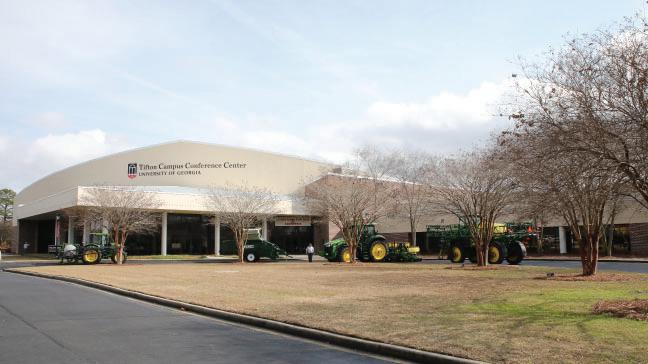
seminars is an investment in the future of their farm.”
The University of Georgia Peanut Team will present an educational peanut production seminar on Thursday morning from 9:00 until 10:30 a.m.
An industry seed seminar will also be held Thursday morning from 10:35 to 11:35 a.m. This event is sponsored
Georgia Peanut Farm Show
January 15, 2026
UGA Tifton Campus Conference Center
Tifton, Georgia
Jan. 15, 2026
8:00 a.m. - Show Opens
9:00 - 10:30 a.m. - UGA Peanut Production Seminar
9:00 a.m. - 2:00 p.m. - Blood Drive
10:35 - 11:35 a.m. - Industry Seed Seminar
Noon - Awards Luncheon
2:00 p.m. - Grand Door Prize
2:30 p.m. - Show Closes

by the American Peanut Shellers Association, Peanut Foundation, Southern Peanut Farmers Federation and the Georgia Peanut Commission. Growers will be able to learn about farm-saved seed, peanut varieties available for 2026 and varieties on the horizon.
Farmers will also have the opportunity to earn credit toward their private or commercial pesticide applicator certification.
A free luncheon begins at noon for all attendees, with an opportunity for farmers to win more than $40,000 in door prizes afterward. The Georgia Peanut Commission will present a short program beginning at 12:15 p.m. that will cover award presentations and other special recognitions.
The Georgia Peanut Commission, in cooperation with One Blood, will hold a blood drive from 9:00 a.m. to 2:00 p.m. at the UGA Tifton Campus Conference Center during the show.
For more information on the show, contact GPC at 229-386-3470 or online at www.gapeanuts.com.
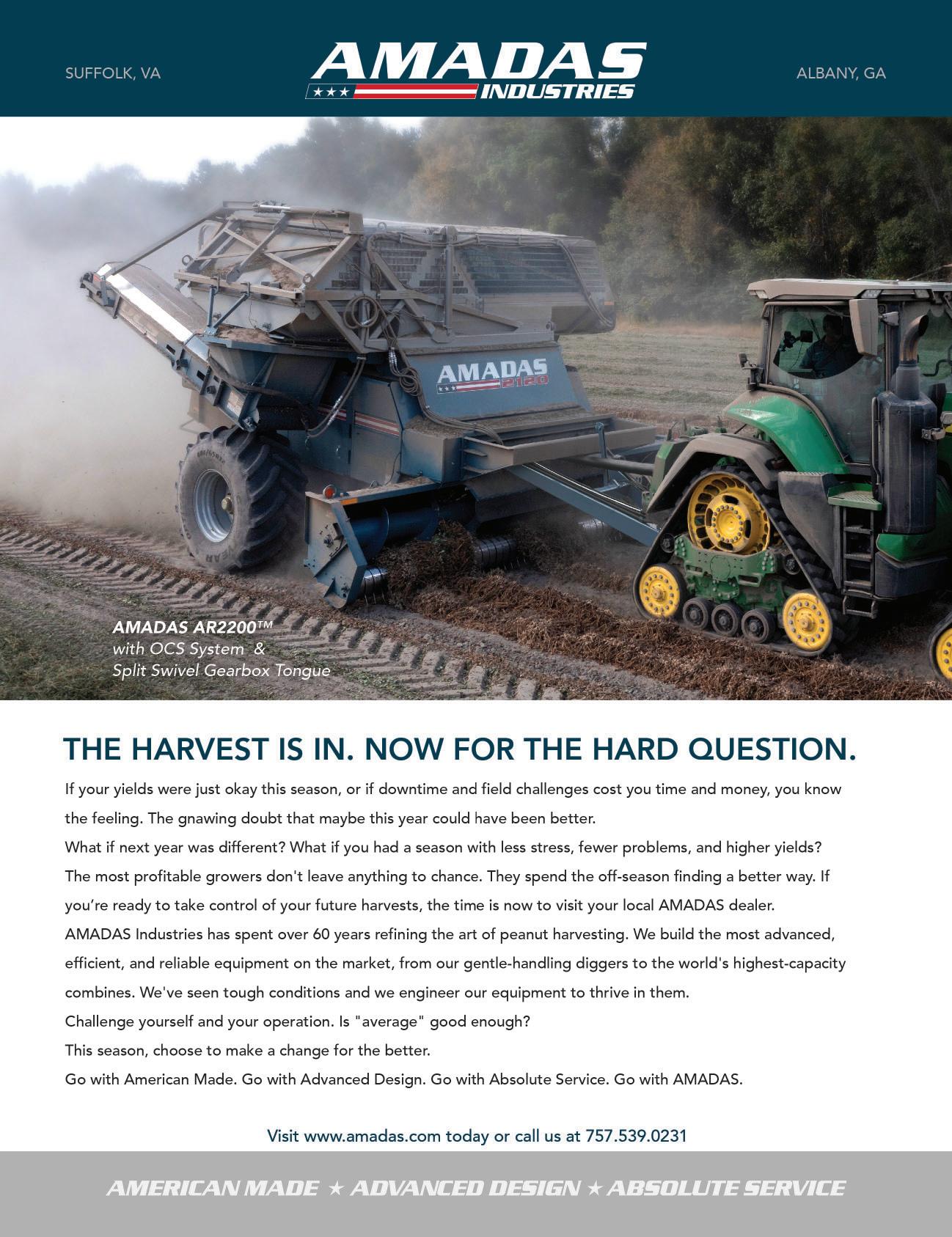
By Joy Crosby
Sixteen farmers were recently announced by the University of Georgia Peanut Team for their high yielding peanuts in 2024. The high yields ranged from 4,145 to 6,095 pounds per acre.
The winners were recognized at a dinner in August which was sponsored by the University of Georgia Peanut Team, Georgia Peanut Commission, American Peanut Shellers Association, National Peanut Buying Points Association, AMVAC, Bayer, BASF, Fine Americas and Nichino America.
Many of the high yielding farmers agree that having a good rotation, good quality seed and good weather make all the difference with their yields. Additionally, the timing of applications for disease, weed and insect management are key in achieving high yields.
“Many of the state winners combine their management strategies like crop rotation, variety, planting date and critical timing of applications of pesticides to reach these high yields,” says Scott Monfort, University of Georgia Extension peanut agronomist. “The yields are counted for the entire farm, irrigated or dryland; and they continue to increase year after year.”
Another component of the farmers' success is following recommendations from the Extension service and asking questions.
According to a report on the production practices of the 2024 winners, the majority use a 3-year rotation plan with other crops such as cotton or corn. Most of the winners plant in twin rows during the month of May.
Another trait among the high yield winners is cultivar selection with many of the winners planting the Georgia06G cultivar. Other cultivars planted
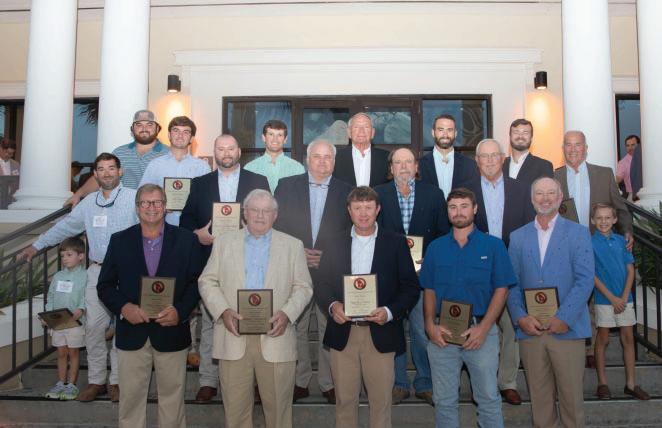
by the winners include TifNV-HG, Georgia-12Y and Georgia-16HO.
The 2024 Georgia Peanut Achievement Club overall state winners are Chase Farms, Macon County, with 6,095 pounds per acre in the 100-299 acre category; Reggie Bostick Sr., Mitchell County, with 6,058 pounds per acre and Stilson Farms, Bulloch County, with 6,082 in the 300699 acreage category, and Sapp Bros. Farm, Mitchell County with 6,089 in the 700-plus acreage category.
The District 1 winners are Caleb Stephens, Webster County, with 4,201 pounds per acre in the 100-299 category, Ben Grimsley, Webster County, with 4,145 pounds per acre in the 300-699 acreage category, and Storm and Kohler Tabb, Early County, with 5,331 in the 700-plus acreage category.
The District 2 winners are TAC Farms, Mitchell County, with 5,087 pounds per acre in the 300-699 acreage category and Jerry and Jeff
Heard Farms, Baker County with 5,607 pounds per acre in the 700-plus acreage category.
The District 3 winners are Lane Goss and Barry Martin, Pulaski County, with 5,461 pounds per acre in the 100-299 acreage category, Trevor Cobb, Washington County, with 5,555 pounds per acre in the 300-699 acreage category and Kerry Hodges, Screven County, with 5,772 pounds per acre in the 700-plus acreage category.
The District 4 winners in the 100299 acreage category are PTH Farms, Grady County, with 4,824 pounds per acre and Clint Webb, Brooks County, with 5,048 pounds per acre. The District 4 winners in the 700-plus acreage category are Clay McKinnon, Coffee County, with 4,832 pounds per acre and Creekwood Acres, Bulloch County, with 5,579 pounds per acre.

By Joy Crosby
The 2025 Southern Peanut Growers Conference was held July 23-25, 2025, at Edgewater Beach Resort in Panama City Beach, Florida. The three-day event provided farmers with information relating to the future of non-food uses of peanuts, legislative updates and more. The event also allowed farmers the opportunity to visit with multiple companies offering services or new products for the farm.
The opening general session featured discussion on the pesticide strategy by the Environmental Protection Agency and the ramifications for the peanut industry. The panel featured Taylor Singleton and Mark Abney with the University of Georgia, and Wilson Faircloth with Syngenta.
Singleton provided an update on EPA's new framework for evaluating pesticides in regards to endangered species compliance. Abney discussed some of the challenges growers and the industry face when trying to select insecticides to use. Representing the crop chemical industry, Faircloth talked about the process of getting a new product to market.
The second general session focused on a Q&A session with Scott Monfort, Extension peanut agronomist with the University of Georgia, and participants in the Peanut Leadership Academy. The panel of PLA graduates included Lonnie Gilbert, Florida; Garrett Dixon, Alabama; Will Krause, Georgia and Douglas Jarrell, South Carolina. Monfort led a series of questions focusing on production practices, management decisions on the farm and non-edible markets for peanuts.
The third general session focused on legislative activities and featured

U.S. House Agriculture Committee
Chairman Glenn "GT" Thompson, R-Pennsylvania. Congressman Thompson addressed the group with an update on ag policy and his hope for a farm bill before the end of the year. Additionally, Bob Redding of The Redding Firm, updated attendees on legislative issues and led a panel discussion with Joe Boddiford, chairman of the Georgia Peanut Commission, Thomas Adams, board member with the Alabama Peanut Producers Association, and Clint Hood, Synovus Bank.
Georgia peanut farmer Billy Senkbeil of Sylvester, brought the keynote speech during the conference luncheon. Senkbeil shared his thoughts on farming as well as his various ways of promoting peanuts through the years.
Awards were presented during the conference to deserving industry representatives and farmers. John Altom with Valent presented the 2025 Valor Award to Ken Barton and John Powell.
Barton retired in April after working for 23 years as executive director of the Florida Peanut Producers Association. Powell has dedicated 38 years of service to the peanut industry by serving as executive director of the American Peanut Shellers Association and The Peanut Institute.
Farm Press presented the 2025 Peanut Efficiency Awards during the breakfast on Saturday morning. The 2025 winners are: Upper Southeast: Brian and Adam Darden, Newsoms, Virginia; Lower Southeast: Riley Davis, Dawson, Georgia; Delta: Atkins Farm, Hamilton, Mississippi; and Southwest: Brent Hendon, Welch, Texas.
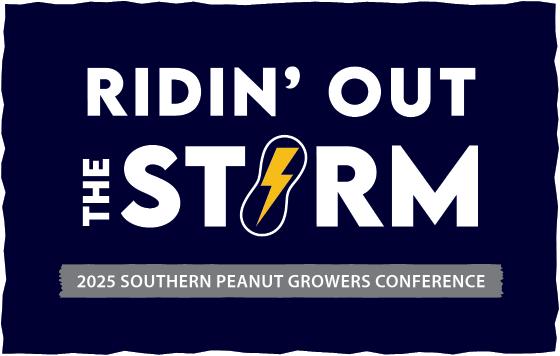
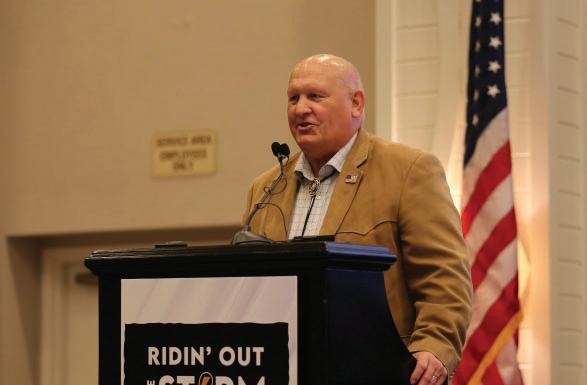
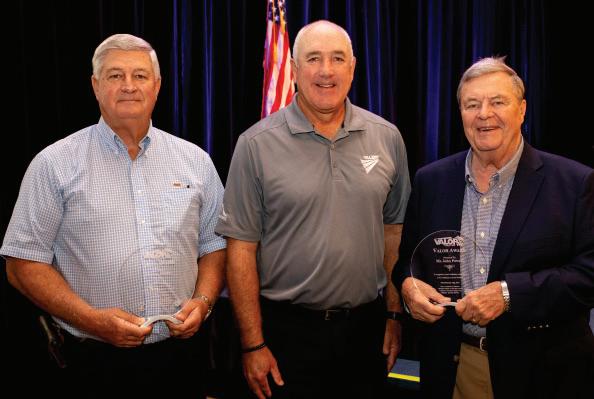
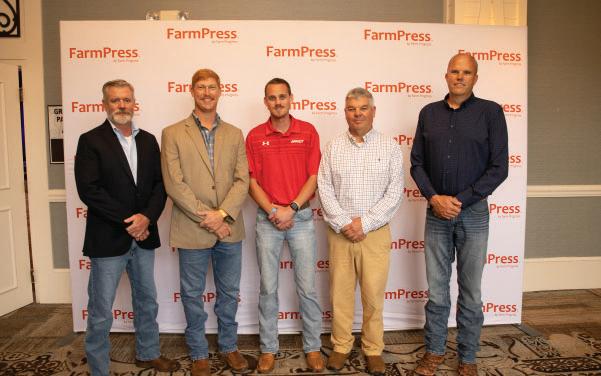
The 2025 Farm Press Peanut Efficiency Award winners are (left to right) Brad Haire, Farm Press; Lower Southeast: Riley Davis, Dawson, Ga.; Delta: Jamie Dean Atkins and Allen Atkins of Atkins Farm, Hamilton, Miss.; Southwest: Brent Hendon, Welch, Texas. Not pictured: Upper Southeast: Brian and Adam Darden, Newsoms, Va.
By Jessie Bland
Twenty-seven peanut farmers and sheller representatives from across the United States graduated from Class XIII of the Peanut Leadership Academy July 24, 2025, in Panama City Beach, Florida. The largest class to date, members consisted of growers from Alabama, Arkansas, Florida, Georgia, North Carolina, South Carolina, Texas and Virginia. The class also included representatives from Birdsong Peanuts, Coastal Growers, Golden Peanut, Premium Peanut, Olam and Sandyland Peanut.

During the week, class participants and their families enjoyed some of the "world's most beautiful beaches," while also having the opportunity to attend the Southern Peanut Growers Conference, the industry’s premier grower meeting boasting 200+ attendees from all segments of the U.S. peanut industry. The conference afforded attendees time to learn and network with others on topics related to pesticide strategies, agronomic and market challenges, legislative updates, as well as the Farm Press Peanut Efficiency Awards. The entire class was


introduced during the second General Session followed by a discussion panel on farmer attitudes with current class members.
The Peanut Leadership Academy is a cooperative effort between Syngenta Crop Protection, the American Peanut Shellers Association and grower organizations. For more information on the program, visit southernpeanutfarmers.org. Class XIV of the program is scheduled to begin in January 2026.

Cutchin Anderson • Tarboro, North Carolina
Eric Bailey • Waverly, Virginia
Emmanuel Bankston • Golden Peanut
Miles Birdsong • Birdsong Peanuts
Sean Jackson • Statesboro, Georgia
August Cassebaum • Lillian, Alabama
Jay Corte • Daphne, Alabama
Riley Davis • Dawson, Georgia
Garrett Dixon • Salem, Alabama
Heath Donner • Manilla, Arkansas
Trevor Dyer • Sandyland Peanut
Henry Froese • Seagraves, Texas
Lonnie Gilbert • Marianna, Florida
Chad Harris • Olam
Judson Hornsby • Iron City, Georgia
Doug Jarrell • Estill, South Carolina
Cason Kirkland • Premium Peanut
Will Krause • Unadilla, Georgia
Kirk Martin • Brownfield, Texas
Daniel McMillan • Enigma, Georgia
Jess McNeill • Americus, Georgia
Phillip Melvin • Altha, Florida
Travis Mixon • Dothan, Alabama
Garrett Moore • Coffee Springs, Alabama
Cody Robinson • Williston, Florida
Chase Trimble • Coastal Growers
Emily Williams • National Peanut Board
The U.S. Food and Drug Administration (FDA) and U.S. Department of Agriculture (USDA) recently published a request for information on Ultra-Processed Foods (UPFs), to help develop a uniform definition of UPFs for the U.S. food supply. The United States Peanut Federation submitted the following comments for FDA and USDA consideration.
The U.S. Peanut Federation represents a unified voice of the peanut industry and is comprised of peanut growers, shellers, and buying points. USPF’s mission is to protect, promote, and improve business conditions for the peanut industry. We appreciate the opportunity to respond to the Food and Drug Administration (FDA) and U.S. Department of Agriculture (USDA) request for information on Ultra-Processed Foods which was published in the Federal Register on July 25, 2025.
USPF applauds the efforts by the FDA and USDA to research and consider options for classifying “ultraprocessed” foods. However, we are concerned that an oversimplified definition of “ultra-processed” that does not consider a food’s nutrient density and health outcomes can be problematic for public health. We submit the following comments for consideration when determining definitions, processes, and guidelines for ultra-processed foods.
“Ultra-processed” should not be the terminology used to define a food’s healthfulness. For example, the NOVA classification system, which has popularized the term “ultraprocessed,” is inherently flawed and can lead to faulty conclusions. In the NOVA classification, ultra-processed foods (Group 4) are industrial formulations primarily composed of substances extracted from foods, along with additives such as flavors, colors, and sweeteners. These
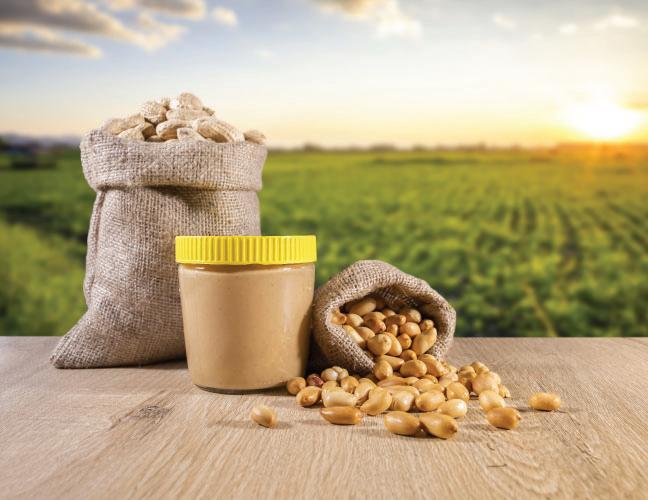
formulations have been associated with unhealthy dietary profiles and increased risks of diet-related diseases. This is an inaccurate method for describing all “ultra-processed” products with no consideration for each product’s individual nutrient contents. In its research, the FDA and USDA should focus on the nutrient density of foods and their health outcomes, rather than on the level of processing.
The FDA and USDA should use a consistent approach for defining healthful foods by considering final rules and determinations made by other agencies and focusing on nutrient density rather than a universal level of processing. For example, the FDA’s final rule on Nutrient Content Claims and the Definition of Term “Healthy” recommended focusing on a whole food approach. Additionally, The 2025 Dietary Guidelines Scientific Advisory Committee concluded that, based on the limited scientific evidence, it does not have strong, specific recommendations regarding ultra-processed foods at this time.
National and international dietary recommendations identify peanuts and peanut butter as nutrient-dense foods that are associated with improved health and reduced chronic disease risk. Peanuts and peanut butter provide high-quality protein, healthy fats, fiber, and many essential vitamins and minerals to consumers and fit into healthy dietary patterns. Scientific evidence shows that peanuts and peanut butter provide health benefits for Americans at every stage of life, including pregnancy, infancy, childhood, adulthood, and older adulthood. There is evidence that the consumption of peanuts and peanut butter can aid in the prevention of at least three of the most prevalent diseases in the United States, including heart disease, cancer, and diabetes. The varied forms of peanuts and peanut products, including peanut oil, peanut butter, and peanut powder, allow for increased versatility in various diets.
As the most widely consumed nut, the per capita consumption of peanuts was 7.3 pounds in 2024 alone,
and approximately fifty-nine percent of all peanuts consumed in the United States are in peanut butter form. The FDA’s current standard of identity on any food labeled “peanut butter” requires that the product contain at least 90 percent peanuts. Therefore, while some peanut butters may add a small amount of added sugar (less than 3 grams) for palatability and/or oil for stability and ease of spreading, the product contains mostly peanuts and has a similar nutrient profile as peanuts. Like peanuts, peanut butter is among the most nutritious, sustainable, shelf-stable, and economical sources of protein. It is highest in protein compared to all other nuts, and protein is known to be important for proper growth and development in children, specifically. In addition to its benefits for children, the nutrient density of peanut butter allows it to confer numerous health benefits for adults, including stabilization of blood sugar in diabetes management. Given these attributes, the nutritional composition and proven health benefits of peanut
We recommend the FDA and USDA prioritize nutrient density and overall health outcomes when evaluating food products, rather than relying on overly broad classifications such as "ultraprocessed."
Jamie Brown Chairman U.S. Peanut Federation
butter should be recognized and prioritized, irrespective of whether the peanuts are consumed whole or in ground form.
In summary, we recommend the FDA and USDA prioritize nutrient density and overall health outcomes when evaluating food products, rather than relying on overly broad classifications such as “ultraprocessed.”
By aligning definitions and guidelines with existing
science-based approaches and maintaining consistency with previous determinations, misleading categorizations will be avoided. An approach that emphasizes nutrient density and measurable health outcomes rather than classifications based solely on the degree of processing in food products will ensure that policies encourage balanced, evidence-based dietary recommendations for consumers.
USPF appreciates the opportunity to provide comments on the “Ultra-Processed Foods; Request for Information” by the FDA and USDA. The peanut industry has long been committed to educating and advocating for healthful lifestyles across all communities. Peanuts and peanut products are economical, accessible, and nutrient-dense foods that offer a plethora of health benefits for consumers. The United States Peanut Federation commends the FDA and USDA for working to ensure the best and safest health for American consumers.
Nominations are now open for the Outstanding Georgia Young Peanut Farmer. The state winner will be announced at the Georgia Peanut Farm Show on Thursday, Jan. 15, 2026, in Tifton, Georgia. The award is sponsored by the Georgia Peanut Commission and BASF.
The Outstanding Georgia Young Peanut Farmer Award is based upon the applicant’s overall farm operation; environmental and stewardship practices; and leadership, civic, church and community service activities.
"We have so many young peanut farmers making a difference in their communities and I consider this awards program a great opportunity to recognize one young peanut farmer for their contributions to the agricultural industry," says Joe Boddiford, chairman of the Georgia Peanut Commission.


The award is open for any active Georgia peanut farmer who is not over 45 years of age, as of Jan. 15, 2026. An individual may receive the award only once. There is no limit on the number of applicants from each county in Georgia.
"BASF is honored to be a sponsor of the Outstanding Georgia Young Peanut Farmer Award,” says
Dan Watts, district manager of BASF Crop Protection Products. "We are committed to agriculture and bringing new innovative solutions to producers that will allow them to continue to be successful.”
Applications are due to the GPC office by Friday, Dec. 5, 2025. The award application is available online at gapeanuts.com or by contacting Joy Crosby at 229-386-3690 or emailing joycrosby@gapeanuts.com.
The 2025 award was presented to Ryan Ireland of Ashburn, Georgia. The award winner receives registration and hotel accommodations to attend the Southern Peanut Growers Conference July 21-23, 2026, at Edgewater Beach & Golf Resort, Panama City Beach, Florida, and a sign to display at his or her farm
By Robert L. Redding Jr.
In August, the White House released a statement regarding the Framework on an Agreement on Reciprocal, Fair, and Balanced Trade ("Framework Agreement") made by the United States and the European Union.
According to the U.S. EU Joint Statement, The European Union intends to eliminate tariffs on all U.S. industrial goods and to provide preferential market access for a wide range of U.S. agricultural goods. Additionally, the European Union and the United States have committed to work together to address non-tariff barriers affecting trade in food and agricultural products.
For almost a decade, the U.S. peanut industry has advocated for EU trade solutions, specifically regarding non-tariff barriers the industry has faced due to EU sampling protocols. The EU has been a long-time importer of U.S. peanuts, and the U.S. peanut industry appreciates the Trump Administration's efforts to assist in strengthening one of our top export markets.
"We are grateful for the efforts made by the Trump Administration to identify solutions to the nontariff trade barrier issues the U.S. peanut industry has been facing. The European Union has the potential to be one of our strongest export markets, but we have continued at a significant disadvantage over our export competitors. This agreement provides a sense of security to the U.S. peanut industry with the knowledge that the Administration has prioritized resolving unfair, non-tariff trade barriers for U.S. agricultural products," says Jamie Brown, United States Peanut Federation chairman.

The U.S. Peanut Federation signed a letter with other agricultural organizations to U.S. Senate Finance Committee Chairman Mike Crapo and Ranking Member Ron Wyden, supporting the nomination of Dr. Julie Callahan to be the Chief Agricultural Negotiator in the Office of the U.S. Trade Representative and urging a swift consideration and Committee confirmation process for the position.
The letter states, "Dr. Callahan brings a deep understanding of global agricultural trade – rooted in her service since 2016 at the Office of the United States Trade Representative overseeing agricultural affairs and commodity policy – and a proven record advancing the interests of U.S. agriculture in complex negotiations. She has worked repeatedly with our organizations on behalf of American agriculture to level the playing field and knock down unfair barriers to trade. Swiftly confirming her and filling this position is vitally important as negotiations continue on reciprocal tariffs and access for U.S. agricultural products with dozens of countries."
On September 17, the Office of the United States Trade Representative published a notice in the Federal Register, "Request for Public Comments and Notice of Public Hearing Relating to the Operation of the Agreement Between the United States of America, the United Mexican States and Canada."
The USTR is beginning a public consultation process ahead of the 2026 joint review of the USMCA agreement between the U.S., Mexico and Canada. Congress has directed USTR to gather public feedback on how the agreement is functioning, and comments are also being sought on the role and performance of the North American Competitiveness Committee created under the agreement.
The U.S. Peanut Federation is communicating with peanut industry sectors to gather feedback regarding the USMCA and will soon submit comments to the Administration.
Congresswoman Julia Letlow Introduces H.R. 5473, the Farm Rescue Act of 2025
On September 18, U.S. Congresswoman Julia Letlow, R-Louisiana, introduced H.R. 5473, the Farm Rescue Act of 2025, which would support the increases in reference price recently included in H.R. 1, the One Big Beautiful Bill Act.
Letlow's legislation would amend the Price Loss Coverage (PLC) program to give eligible farmers the option of receiving an advance payment of 40-50 percent of their projected PLC payment for the current crop year. This authority applies only to the current crop year and is designed to help producers manage their finances between now and Fall 2026, when regular PLC payments for the 2025 crop year would normally be issued.
"The Farm Rescue Act provides more timely support for our Louisiana growers in time for the 2026 planting season," says Congresswoman Letlow. "It's no secret that our farm economy is facing increasing pressure. My bill ensures farmers can access a portion of their PLC support early, easing cash flow concerns and putting them in a stronger position for the next planting season."
Effective April 5, 2025, all countries are set at a 10 percent baseline tariff, unless replaced by a country-specific rate. Effective Aug. 7, 2025, any countries that transship products to evade the applicable reciprocal tariff will be set a 40 percent tariff in lieu of the baseline or country-specific tariff rate.
European Union: On July 27, President Trump announced a trade deal with the European Union. The U.S. and EU reached a Cooperation Agreement on Reciprocal, Fair and Balanced Trade, which includes a provision for the EU to pay the U.S. a tariff rate of 15 percent, including on autos and auto parts, pharmaceuticals, and semiconductors. However, the sectoral tariffs on steel, aluminum, and copper will remain unchanged—the EU will continue to pay 50 percent and the parties will discuss securing supply chains for these products.
According to the White House, additional key terms of the U.S.-EU Agreement include:
• The EU will invest $600 billion in the U.S. over the course of President Trump’s term. This new investment is in addition to the over $100 billion EU companies already investing in the U.S. every year.
• The EU will work with the U.S. to eliminate tariffs in various sectors and will provide meaningful quotas for other products, which when combined will create commercially meaningful market access opportunities for a significant amount of U.S. goods exports to the European Union, supporting high-quality American jobs.
• The U.S. and the EU intend to work together to address non-tariff barriers affecting trade in food and agricultural products, including streamlining requirements for sanitary certificates for U.S. pork and dairy products.
• The U.S. and the EU agree to strengthen economic security alignment to enhance supply chain resilience and innovation. The two sides will take complementary actions to address non-market policies of third parties, as well as cooperating on inbound and outbound investment reviews, export controls, and duty evasion.
Canada: On July 28, President Trump signed an Executive Order increasing the tariff on Canada from 25 percent to 35 percent, with the higher tariff set to go into effect on Aug. 1, 2025.
According to the White House, additional terms of the Executive Order include:
• Goods qualifying for preferential tariff treatment under the United StatesMexico-Canada Agreement continue to remain not subject to the IEEPA Canada tariffs.
• No reciprocal tariffs at this time.
Mexico: On July 28, President Trump made a statement outlining details for a potential trade deal with Mexico. The current agreement states that for 90 days, Mexico will pay a 25 percent fentanyl tariff, 25 percent tariff on cars, and 50 percent tariff on steel, aluminum, and copper. Mexico agreed to immediately terminate its non-tariff trade barriers, and work to complete an official trade deal for the U.S. and Mexico within 90 days.
China: Effective August 11, China's country-specific rate is suspended until November 10. During this time, imports from China will be subject to only the 10 percent baseline reciprocal tariff rate.
Agriculture Labor Update: Current Key Legislative Initiatives
Labor Working Group
During the 118th Congress, Chairman Glenn "GT" Thompson, R-Pennsylvania, and Ranking Member David Scott, D-Georgia, created a bipartisan congressional group to focus on the agriculture workforce. The group's co-chairs are U.S. Reps. Rick Crawford, R-Arkansas, and Don Davis, D-North Carolina. A final report with policy recommendations was released in March 2024 and provided to the U.S. House Judiciary Committee. Chairman Thompson has expressed his intent to introduce legislation this fall based on the policy recommendations outlined in the ALWG's final report.
Potential Legislation Passed During the Appropriations Process - Adverse Effect Wage Rate Freeze to 2023 Levels
The U.S. House Appropriations Subcommittee on Labor, Health and Human Services, and Education included the following language during their bill markup on Sept. 2, 2025. This legislation was approved by the U.S. House Appropriations Committee during their full committee markup of the bill on Sept. 9, 2025. The bill will soon be considered on the floor of the U.S. House of Representatives.
The bill includes, "For the 2-year period beginning on the date of the enactment of this Act, the Adverse Effect Wage Rate in effect under 20 CFR 655.120(b) shall be the Adverse Effect Wage Rate in effect on Jan. 31, 2023."

Southern Peanut Growers partnered with A-1 Broadcasting and Genexa to sponsor a satellite media tour with nationally recognized parenting expert and mom blogger Amanda Mushro during Baby Safety Month in September. When babies are ready to start solid foods, Mushro pointed to the importance of introducing peanut products.

Amanda Mushro, parenting expert and mom blogger, did 24 television interviews about early introduction of peanut products during Baby Safety Month in September.
Research shows that introducing peanut foods to babies between four and six months can reduce the risk of developing a peanut allergy by 86 percent. Early and often is key. Peanut butter or peanut powder can be mixed with breast milk, formula, or water and served with a spoon, or combined with foods the baby is already eating.
Mushro did 24 interviews on Sept. 4, 2025, which resulted in a cumulative audience of more than 14.4 million people with a comparable advertising value of $284,534.
Southern Peanut Growers exhibits at Minnesota
Leslie Wagner, Southern Peanut Growers executive director, exhibited at the Minnesota School Nutrition Association's Annual Conference in Rochester, Minnesota, Aug. 4-5. Minnesota is one of the top states in terms of students participating in the school nutrition program which put it on the short list for outreach through the cooperative effort in K-12 school nutrition led by the National Peanut Board. There were 180 purchasing decision makers in attendance and SPG received a contact list for follow up with the new "What's Missing? Peanut Butter!" campaign.
The Culinary Institute of America’s Healthy Kids Collaborative (HKC) is a year-round, invitational initiative designed to both accelerate innovation and deepen technical and professional expertise in K-12 school foodservice. There are currently 60 HKC members nationwide, representing 2,207 schools, 17.5 million students, and 40 million meals served each school day.
National Peanut Board hosted a HKC webinar Aug. 14 to launch NPB's Something's Missing Campaign to return peanuts and peanut butter to K-12 school nutrition. Markita Lewis, NPB's registered dietitian, led off with the why peanuts and peanut butter should be included: good nutrition, inexpensive and vegetarian protein source and culturally inclusive eating patterns. She followed the details of food allergy and how food allergens, including peanut foods, should be properly managed in schools: Plan, Don't Ban!
Leslie Wagner, executive director of Southern Peanut Growers, followed with all the ways Georgia peanut farmers have been working with school nutrition professionals, Georgia School Nutrition Association, chefs, the Georgia Department of Agriculture and the Georgia Department of Education to support school nutrition professionals in the serving of healthy and tasty meals including Georgia Peanuts.
The Peachtree Road Farmer's Market (PRFM) in Buckhead celebrated Georgia Peanuts Day on Aug. 2. PRFM is one of the largest producer-only farmer's markets in the state of Georgia. This means that everything sold at the market has been grown, raised or made by the seller which helps to ensure fair pricing.
David West, Leslie Wagner and Ted Nelson manned the Georgia Peanuts table which was set up within the Georgia Grown tent. In addition to Georgia Peanuts and peanut butter spreaders, attendees also received samples of peanut butter cookies. Chef Duane Nutter presented two recipes in the Georgia Grown tent, one of which was a Peanut Butter and Bacon Breakfast Burrito and selling his new cookbook.

Leslie Wagner with Southern Peanut Growers and David West with the Georgia Peanut Commission pass out peanut samples at the Peachtree Road Farmer's Market.
There were 12 vendors with Georgia Peanut products and each of those tents was marked with balloons by the festival organizer. There was a peanut character roaming the market for photos and FOX 5 Atlanta had a live reporter at the market that day who did two interviews with Leslie Wagner from the Georgia Peanuts booth.
